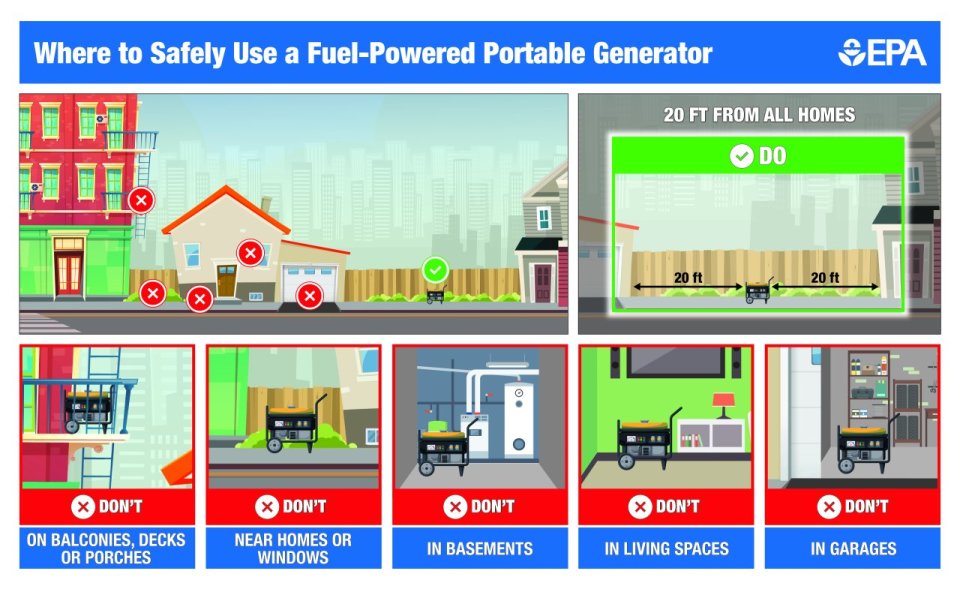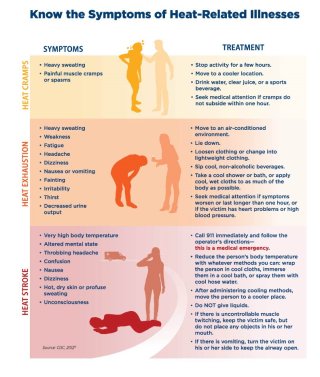Extreme Heat and Indoor Air Quality
When indoor temperatures rise, people can suffer from potentially deadly illnesses, including heat exhaustion and heat stroke. It’s important to be prepared whether or not you have air conditioning at home – a power outage could render cooling systems useless at just the wrong time. Follow the tips and safety precautions on this page to protect your family and your indoor air quality during extreme heat events.
On this page:
- Keep Your Indoor Air Cool
- Prevent Heat-Related Illness
- What to Do if the Power Goes Out
- Additional Resources
On other pages:
Keep Your Indoor Air Cool
If you have air conditioning, have your unit(s) cleaned and serviced before heat arrives. Use your air conditioner to keep your indoor air cool during extreme heat events.
If you don’t have air conditioning, plan where to go to keep cool during extreme heat. For example, public cooling centers or other buildings like malls and libraries may offer some relief during the day. During an extreme heat event, spend as much time as you can in locations with air conditioning.
Know that portable electric fans do not cool air. They just move the air around and keep you cool by helping to evaporate your sweat.
Ventilation and shading strategies can help control indoor temperatures and conserve energy during extreme heat:
- Cover windows that receive morning and afternoon sun with shades to help limit a rise in indoor temperatures.
- You can use drapes, shades, roller shades, awnings, or louvers to cover your windows. Outdoor awnings and louvers can reduce the heat that enters a home more than indoor shades.
- In general, if the air outside is hotter than the air inside, close the windows. If the air outside is cooler, open the shades or drapes, and the windows.
Although keeping windows and doors closed may help maintain temperatures, in some cases you may need to open the windows slightly to maintain adequate ventilation during activities that may reduce air quality indoors. Consider the outdoor air quality where you live before opening windows. If outdoor air quality is poor, try to avoid or delay activities that reduce air quality indoors (e.g., cooking) until you can provide better ventilation.
More significant projects, such as properly air sealing and insulating your attic, may reduce how much your home heats up during extreme heat events.
Learn about tips to help your home withstand heat waves and maintain indoor air quality.
Prevent Heat-Related Illness
- CALL 911 in case of heat-related illness. Heat stress, heat exhaustion or heat stroke can result in death.
- Learn the symptoms of heat-related illnesses (CDC) and the appropriate responses (CDC):
- Learn what to do if you or someone you care for is at a higher risk of getting sick from extreme heat (CDC). Older adults (aged 65+), infants and children, people with chronic conditions, people without air conditioning, people who work outside, and athletes who train or compete outdoors are at greater risk.
- The National Weather Service’s HeatRisk index (NOAA) provides a forecast risk of heat-related impacts to occur over a 24-hour period to help heat-sensitive populations take action when they may be affected by extreme heat.
What to Do if the Power Goes Out
If the power goes out during an extreme heat event, remember to use the ventilation and shading strategies above to help control indoor air temperatures when air conditioning or fans are not available.
Safely provide power for lighting and cooking:
- Do use battery-powered flashlights or lanterns rather than candles, if possible. Candles can lead to house fires. If you do use candles, never leave lit candles unattended.
- Do not use fuel-powered portable generators indoors. If you use portable generators, use them outside and at least 20 feet away from buildings. Always follow the manufacturer's instructions for using portable generators or combustion appliances, and ensure they have adequate ventilation.
- NEVER use a generator inside your home, garage, shed, or similar enclosed areas. Generator exhaust contains deadly carbon monoxide.
- Do not use the generator or appliances if they are wet or in locations that could become wet. This can cause shock or electrocution.

Quickly get to fresh air if your CO alarm sounds or you recognize any of the symptoms of CO poisoning: headache, dizziness, weakness, upset stomach, vomiting, chest pain, and confusion. Then call for help and stay in fresh air until emergency personnel arrive.
For more tips and information, visit EPA's websites on Power Outages and Indoor Air Quality and Carbon Monoxide’s' Impact on Indoor Air Quality.
Additional Resources
- EPA Excessive Heat Events Guidebook (PDF).
- EPA/CDC Climate Change and Extreme Heat: What You Can Do to Prepare (PDF).
- Find more on our Federal Partner Resources on Emergencies and IAQ webpage.

